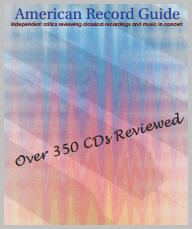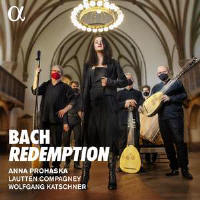Texte paru dans: / Appeared in:
|
|
|
Outil de traduction ~ (Très approximatif) |
|
|
Reviewer: Robert
A. More
During the shutdown of public
performances as the coronavirus became widespread, Anna Prohaska, Wolfgang
Katschner, and about 20 members of the Lautten Compagney gathered to make
music. They asked themselves: “Can music give us consolation in times of
sickness and crisis; can it open up emotional and contemplative spaces for
us; is it redemptive for us as musicians to be the ‘instruments’ in
engendering music and therefore spirituality?” They found that performing
together in this time supplied a kind of redemption (or consolation) for
them as artists, which led to the development of a program they called
“Redemption”. Beyond the redemption or consolation it gave them as
performers, the album is a testimony about redemption of the human condition
with a carefully chosen selection of movements from Bach cantatas that build
a smart sequence from wrestling with sin and guilt toward acceptance of
death with peaceful confidence. As Prohaska mentioned in an interview, “We
wanted to send out a signal of hope: that even during a pandemic Bach’s
music is like a consoling hand.” With accompaniment by distinguished early
music performers Prohaska sings 10 arias and is joined in 4 choruses by 3
other singers: Suzanne Langner (alto), Christian Pohlers (tenor), and
Karsten Müller (bass). A few vocal movements are performed in instrumental
arrangements: four cantata chorales and a soprano aria from a secular work,
the Hunt Cantata (a birthday cantata for Prince Christian von
Sachsen-Weissenfels that contains ‘Sheep May Safely Graze’). The
instrumentalists are exceptionally good and the performances are recorded in
immaculate but warm sound. They do a skillful job of depicting the death
bells or ticking of a clock in ‘Die Seele Ruht in Jesu Händen’ from Cantata
127 Herr Jesus Christ. Sequences are created out of cherry-picked movements
from separate cantatas. Three movements of Cantata 150, Nach dir, Herr,
Verlanget Mich (Lord, I long for you), are placed at different points in the
program. Prohaska begins
with the somber aria ‘Bete aber Auch Dabei Mitten in dem Wachen!’
(Pray nevertheless also during
your vigil!) from Cantata 115, Mache Dich, Mein Geist, Bereit (Make yourself
ready, my spirit), imploring purification from sin. That flows without pause
into the opening chorus of Cantata 25, Es ist Nichts Gesundes an Meinem
Leibe, a confession of deep sinfulness. It is followed by a plea for
forgiveness in the closing chorale from Cantata 135, Ach Herr, Mich Armen
Sünder. That chorale, ‘Ehr’ sei in’s Himmels Throne’, in praise of the
eternal blessedness of the Trinity, is one of Bach’s more elaborate final
chorales, but unhappily it is played in a simplified arrangement for
instruments. The chorale tune, ‘Herzlich Tut Mich Verlangen’ (I do desire
dearly a blessed end) by Hans Leo Hassler, is better known as the Passion
Chorale and was used in various harmoniza-tions by Bach many times—five
times in the St Matthew Passion alone. The notes tell none of this, and no
text of the chorale (or any of the others) is included, but just recognizing
the tune carries a further message of redemption to listeners. The practice of singing Bach cantatas with one voice per part in choruses is justified, especially in this time of pandemic when social distancing is necessary. It allows each line to be heard clearly, and the quartet sings well, but in the end I found it mostly unsatisfying. The final chorus of Cantata 150, Nach Dir, Herr, Verlanget Mich (Lord, I long for you), considered Bach’s earliest extant cantata, is a perfect way to end the program in confidant assurance. This time it works well with a solo quartet as the text alternates between solo lines and quartet. What is especially significant is the way Bach builds it so skilfully as a chaconne.
It is beautifully performed. I
thought the program had come to an end at this point, but it continued with
an unlisted encore: a jazzy scat arrangement of the aria that began the
program, ‘Bete Aber auch Dabei’. It’s an odd thing to do, so you might want
to stop before you come to it and listen to it some other time if you are
curious.
Alpha recorded and released
this very quickly. It is a comforting program for this time of pandemic when
a shut-down of what we have considered normal is difficult but necessary.
Each track is lovely (even the encore) and it all is well performed, but I
will happily return to hearing Bach’s cantatas performed in their entirety.
Notes, texts,
translations. | |
|
|
|
|
Cliquez l'un ou l'autre
bouton pour découvrir bien d'autres critiques de CD |
|




